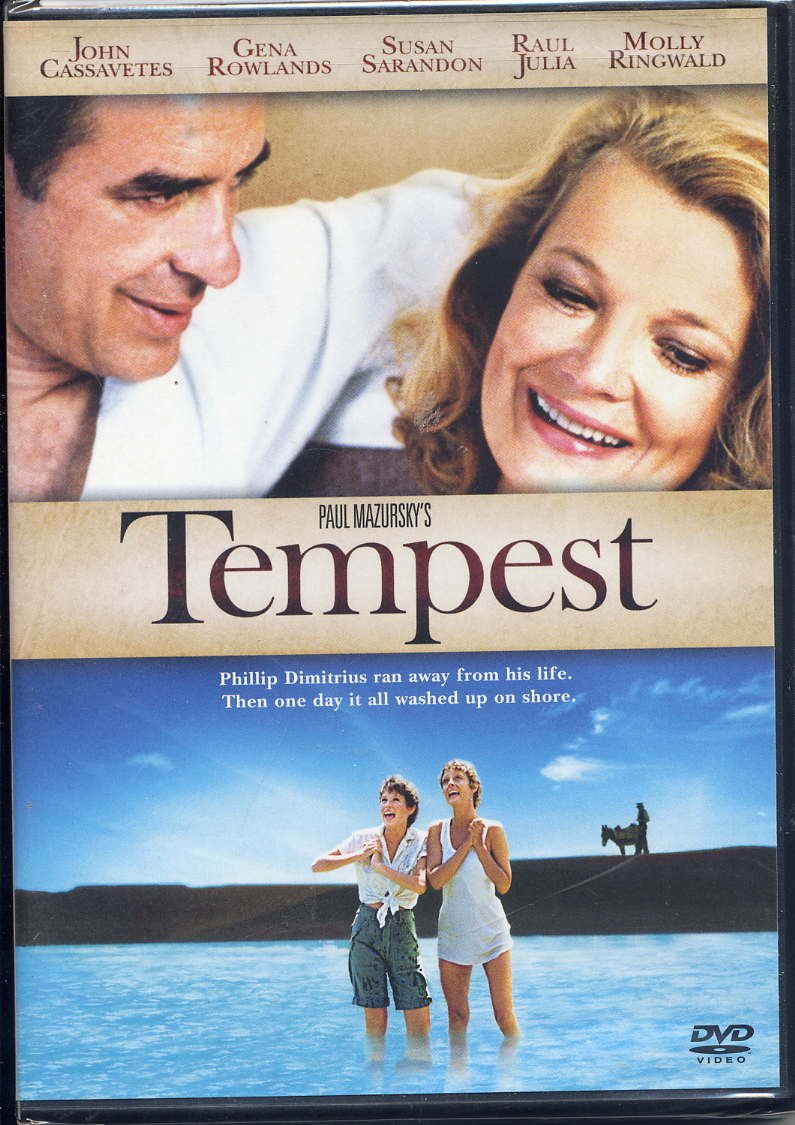 Tempest. Dir. Paul Mazursky. Perf. John Cassavetes, Gena Rowlands, Susan Sarandon, Raul Julia, and Molly Ringwald. 1982. DVD. Sony Pictures, 2007.
Tempest. Dir. Paul Mazursky. Perf. John Cassavetes, Gena Rowlands, Susan Sarandon, Raul Julia, and Molly Ringwald. 1982. DVD. Sony Pictures, 2007.Tempest (N.B.: Not The Tempest—just Tempest) is better known than the selection from Extras, but it's still somewhat obscure, partly because it has only recently been released on DVD.
Kenneth S. Rothwell would classify this film as a recontextualization (rather than an adaptation) of a Shakespeare play. It has a plot roughly like that of the play, but it does some remarkable things with it.
I'm fond of the figure of Caliban in this film (he goes by the name of Kalibanos). He's one of the great successes in the play—he's funny and winning and sympathetic.
He's all that in part because of the Prospero analogue (Phillip). We get a lot of his backstory. He's an architect who was very controlling and had something of a midlife crisis / breakdown. He took his daughter to a nearly-uninhabited Greek island with a platonic girlfriend (the Ariel analogue) to recover.
Briefly, I'd like to present one wonderful exchange is between Kalibanos and Philip (the Prospero analogue). Philip, jealous of the unwanted attention Kalibanos is paying Miranda, throws Kalibanos in the water. Kalibanos shouts up out of the water:
Kalibanos: I was boss before you show up. Me—boss!
Philip: You were ignorant, you superstitious bastard. I taught you how to read. I taught you how to count, fix the pump, read the stars . . . .Kalibanos counters this with this line:
I show you the olive, and the fig, and the sweet water.After some additional arguing, Philip knocks Kalibanos senseless with the oar. Then, somewhat reluctantly, he rescues him.
It's hard to tell exactly what Kalibanos says at that point. The subtitles have him say "You are a god, boss," but it sounds more like he's saying "You are God, boss."
In either case, Philip's reply is clear enough:
Philip: I'm no god. I'm a monkey, just like you.
Later, during the tempest itself, Kalibanos shouts to Philip: "You are God, boss!" And later still, when Philip seems unable to control the storm he seems to have summoned, Kalibanos has one more speech on the subject:
Kalibanos: You not God. Only God, God!
It's a delightful version of the tensions in the exchange betwwen Caliban and Prospero in I.ii, culminating in Caliban's speech:
You taught me language, and my profit on'tIs . . . I know how to curse. The red-plague rid youFor learning me your language! (I.ii.363-65)
The most delightful scene is one in which Kalibanos dances with his goats. It might be styled with this epigraph:
You taught me language, and my profit on'tIs . . . I know all the lyrics to "New York, New York!"
Here's that delightful scene:
The film is one I'm glad to have seen in the theatres—on the big screen—even though I didn't like it at the time. I'm now able to appreciate things about it that were completely mysterious to me at the time. Yes, like the dancing goats.
Links: The film at IMDB.
Links: The film at IMDB.
Click below to purchase the film from amazon.com
(and to support Bardfilm as you do so).
(and to support Bardfilm as you do so).









No comments:
Post a Comment